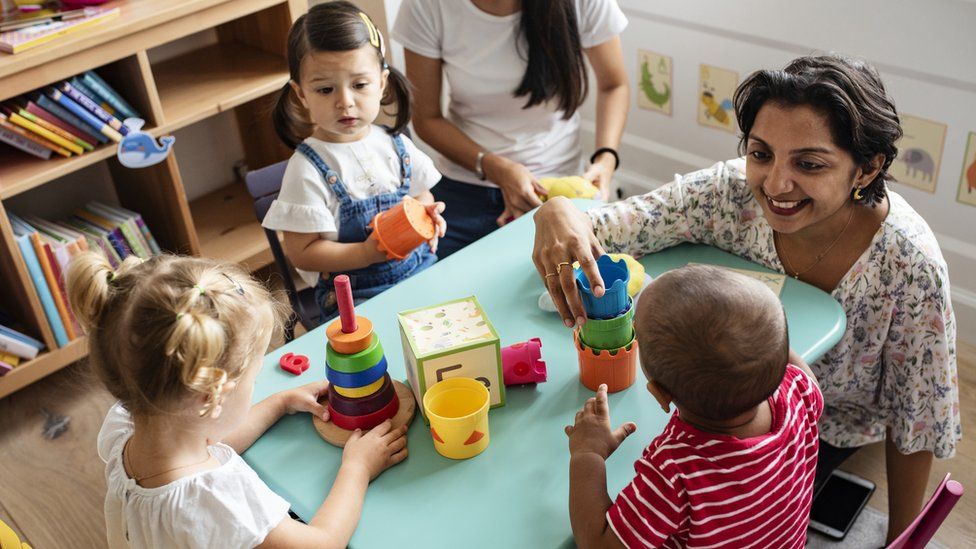
A motion to be introduced by Sinn Féin calls on the Executive to provide affordable childcare as a priority
A Sinn Féin motion on “unaffordable” childcare costs is to be debated in the Stormont Assembly later.
Currently, there is no scheme in place for free childcare in Northern Ireland.
Aoife Hamilton, from the umbrella group Employers for Childcare, said Northern Ireland is at an “immediate crisis point” regarding childcare.
“Whether you have children or not, this affects all of us,” she told the BBC’s Sunday Politics programme.
“If [parents] can’t get to work, this is a major issue for our economy but also for all of the sectors that we know will be priorities for the new executive – health, education, infrastructure.”
Ms Hamilton said there needs to be “immediate support” for the sector.
Employers for Childcare’s Aoife Hamilton says a lack of a childcare strategy in Northern Ireland “affects all of us”
The motion comes days after a nursery in Lisburn announced it will close within weeks because of cost pressures and difficulties in staff recruitment.
Birdies Day Nursery, which is privately run and has 60 places, said the decision was made with “unbelievable sadness”.
Last year, a major review by the Department of Education found that the majority of parents on low and middle-incomes “consider childcare to be unaffordable”.
Parents have previously told BBC News NI that more financial support from the government is needed in order to tackle “extortionate” childcare costs.
The Sinn Féin motion, entitled High Quality Affordable Childcare, proposes that the assembly recognises that childcare costs are “unaffordable” for many and urges MLAs to recognise the childcare sector “is in need of urgent and significant investment”.
Alliance’s Kate Nicholl says Northern Ireland needs to learn from other nations and create a bespoke childcare strategy
Alliance MLA Kate Nicholl told BBC News NI’s Good Morning Ulster programme that it was “crucial” to invest in the sector.
“It’s unaffordable right now for parents and, honestly I know this is the way the debate is going to go – can we afford it right now? We honestly cannot afford not to invest in this,” she said.
Ms Nicholl said getting both affordable and high-quality childcare is one of the main problems, and a rise in prices in April will be “devastating” for parents.
“Childcare is not babysitting. It is early intervention, it’s child development, it’s a means of supporting economic activity, gender equality, access to the labour market,” Ms Nicholl added.
“It is economic infrastructure. So it’s not just something that would be nice for families to have – it is crucial that we invest in it.
“Yes it will be expensive, but it is so much more expensive not to invest in it.”
‘We need to move quickly’
Also speaking on Sunday Politics, Deputy First Minister Emma Little-Pengelly said that while she was glad there was cross-party support for childcare provision, a solution “is not going to be simple”.
Ms Little-Pengelly said one of the “very few advantages” of coming in behind other regions is that Northern Ireland could learn from difficulties they have faced.
“The DUP had set out a 30-hours free childcare promise but that doesn’t mean it’s a cut and paste from the English system,” she said.
“It is in crisis, we need to move quickly while we continue the work on a really good, well-designed childcare strategy that is actually going to work for parents, for children, and for those who are providing those services.”
What childcare help is available in Northern Ireland?
While there is currently no free childcare scheme available in Northern Ireland, working parents can avail of some supports.
This includes tax credits, universal credit, childcare vouchers and tax-free childcare.
That is different to the likes of England where many working parents of three and four-year-olds are eligible for 30 hours of free childcare per week during term time.
Image source, Getty/Westend61
Childcare is a devolved matter so it is up to Stormont to decide on cost matters
Education Minister Paul Givan has said the provision of affordable childcare is at the top of his agenda as a “matter of urgency”.
In a statement to BBC News NI on Saturday, Mr Givan said: “The changes I want to see will require significant and ongoing investment to ensure long-term solutions to support the early learning and childcare sector to grow.
“I trust the executive will make good on their promises.”
He added that as minister he has “ambitious plans” for a strategy that will work for both families and children.








